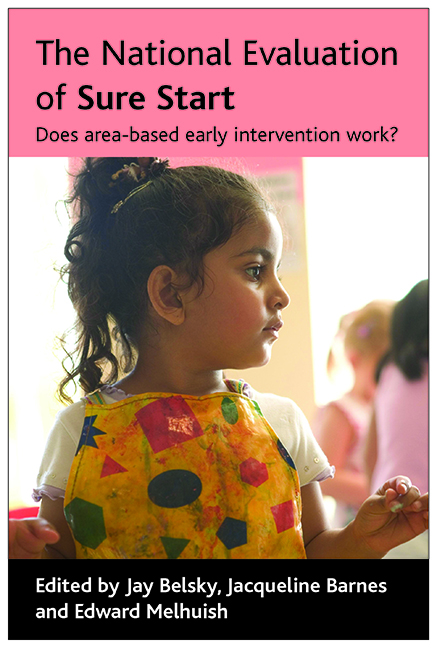Book contents
- Frontmatter
- Contents
- List of tables and figures
- Foreword
- List of abbreviations
- Notes on contributors
- Part One The historical and policy context
- Part Two The local context of Sure Start Local Programmes
- Part Three The implementation of Sure Start Local Programmes
- Part Four The impact of Sure Start Local Programmes
- Part Five Conclusion
- Index
Foreword
Published online by Cambridge University Press: 15 September 2022
- Frontmatter
- Contents
- List of tables and figures
- Foreword
- List of abbreviations
- Notes on contributors
- Part One The historical and policy context
- Part Two The local context of Sure Start Local Programmes
- Part Three The implementation of Sure Start Local Programmes
- Part Four The impact of Sure Start Local Programmes
- Part Five Conclusion
- Index
Summary
I was delighted to be asked to write the foreword to this comprehensive story about Sure Start. There is considerable detail in the forthcoming chapters, so my particular contribution is a personal reflection on the beginnings of Sure Start and its subsequent development over the years, 1998-2006. The world of children's services in England is unrecognisable from where we were in 1998 and as is common in social policy change, we quickly forget how much worse things were, and constantly consider how much better they could be. Things for young children and their parents are infinitely better than they were nearly 10 years ago and Sure Start has been a major part of these improvements. We are not yet Sweden, but services for young children are now better in England than in most other Anglophone countries. Visitors from all over the world are now coming to England to see what we have done and how we have done it.
The beginning of the Sure Start story is the 1998 Comprehensive Spending Review (CSR) on Services for Children under Eight. This review was run by Her Majesty's Treasury and sought to find out how much was spent on young children and how effective the spending was in delivering better outcomes for children. Unsurprisingly, the review found that most of the money spent on children was spent on those of school age, five years and above, and that the system for funding services for younger children was virtually non-existent. More importantly, the CSR found that the money that was spent had no overall goals or coherent strategy and was administered from different government departments. The only universal services were midwifery and health visiting. Public funding for nursery education was left to local authorities, as was funding for day care.
The CSR also found that, particularly for children in poverty, there were enormous gains in providing services for parents and for children from pre-birth to the very early years. Several mainly American studies had found that investment in early years provision, if high quality and relevant to parents and children, pays off in reduced costs in later life: fewer teen pregnancies, less crime, better staying-on rates at school.
- Type
- Chapter
- Information
- The National Evaluation of Sure StartDoes Area-Based Early Intervention Work?, pp. vii - xiiPublisher: Bristol University PressPrint publication year: 2007



